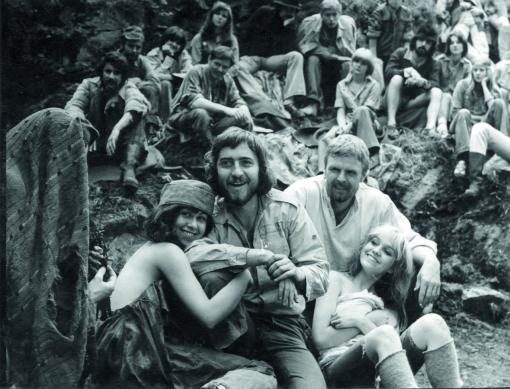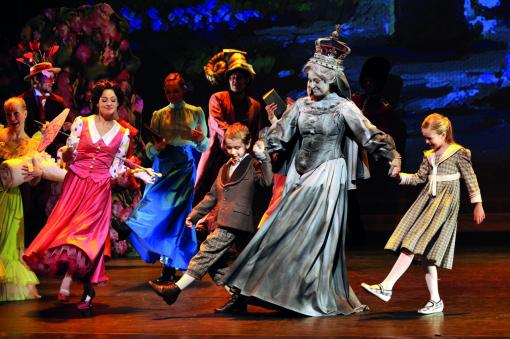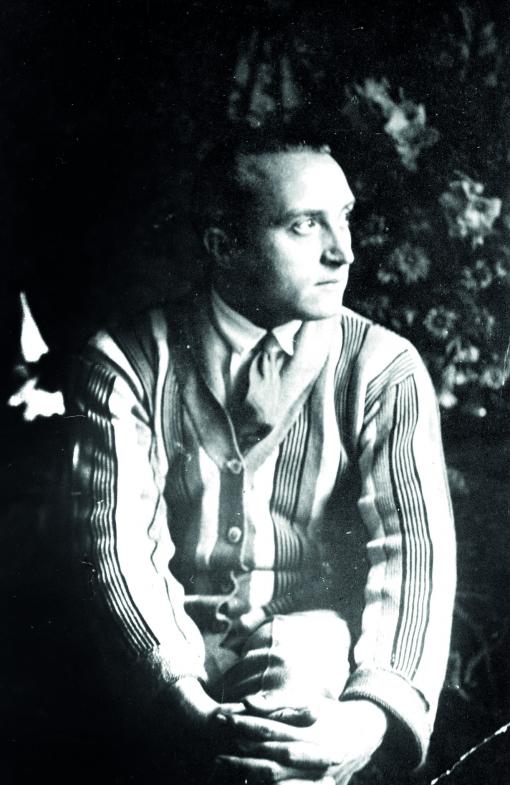Operetta is a wilful child that stopped obeying its parents and ran away from the opera house. Its origin is much more explicable when one considers France, where operetta emerged in the midnineteenth century as an entertaining and often very sarcastic polar opposite to the megalomaniacal productions of “grand opera”. In Brno, as was the case everywhere else in the world, operetta appealed to the broad public, offering both social satire as well as quite conventional entertainment. In the interwar period, thanks to the enlightened lead of Oldřich Nový, it took on a sophisticated polish. Later the Brno theatre scholar Ivo Osolsobě was able to give it a solid theoretical basis, and so move on from the stultified operetta to the lively musical. Today Brno boasts not only a theatre built specifically for musicals but a degree programme in Musical Acting at JAMU. Through the musical A Ballad for a Bandit the brigand Nikola Šuhaj set off from Brno into the world of theatre and film, while Brno’s Liza Doolittle made her living as My Fair Lady of Zelný trh, Brno’s ancient market square. And so we’ve come full circle: the square is the site of the Reduta theatre, operetta’s home in times past.
 A Ballad for a Bandit - a huge hit on stage and screen. Photo: DHNP archives
A Ballad for a Bandit - a huge hit on stage and screen. Photo: DHNP archives
A Marriage of Music, Theatre and Popular Entertainment
When the student Theatre on Orlí put on Jacques Offenbach’s The Wedding by Lantern-Light in 2017, it was a return to the genre’s local roots: in all probability this comic piece was the first operetta ever performed in Brno – in 1859, only two years after its premiere in Par- is. So operetta was launched on its path to widespread popularity, and Brno took the first step to becom- ing today’s musical theatre centre for the whole Czech Republic.
The first operetta in Brno was performed in German; a quarter of a century had to pass before operetta in Czech appeared on the scene. And it was a further thirty years before the first operetta by a Czech was staged at Brno’s National Theatre - Polish Blood, by the composer Oskar Nedbal.
Operetta was a welcome source of revenue for the opera theatre, but it wasn’t a welcome guest. Oper- etta only ceased “encumbering” the Brno opera after the creation of an independent Czechoslovakia in 1918: in the 1918-1919 season a separate musical theatre company was set up.
Oldřich Nový and a New Era
The creation of the new compa- ny brought with it the problem of who to hire. Operetta has its own special features and places its Oldřich Nový own particular demands on singing actors and acting singers. This was even more true in the period after World War I, when opera acting was a world unto itself and opera directing as such a very young dis- cipline. But among the new mem- bers of the troupe was the actor Oldřich Nový.
As joint author Nový also took credit for the highly successful theatre revue From Brno to Brno. The protagonists were the brothers Valentin and Václav Šindler, who as Uncle Křópal and Jozéfek Melhoba introduced the public to a Brno that was exciting, a city full of surprises and snares for the unwary, all this presented in the broad dialect of the neighbouring Hana region. If someone ever wishes to trace the origin of Brno’s love of selfirony, the search should start here. The link with the suave and charming Nový is a surprising bonus.
Nový’s departure from Brno in 1935 foreshadowed the collapse of the First Republic and the German oc- cupation. Operetta remained on the programme (at least as long as the theatres were still open). It copied its more serious sister opera and more distant cousin the symphony con- cert by putting greater emphasis on Czech titles and love for the country in general. But the difficult times that began for operetta with the war have continued down to the present day.
Bourgeois Monster, KateA, and a Bandit
From time immemorial operetta has had to face the charge that it’s a debased genre only the rationale for the charge changes. After World War II, and even more strongly with the coming of the Communist dic- tatorship, operetta became one of the symbols of bourgeois enter- tainment. But this didn’t mean that socialist aesthetics rejected it out of hand: on the contrary, it began to use operetta as a propaganda tool.
In the Soviet Union, operettas were composed based on topical themes, and many of them were produced here in Brno. Among the home-grown Czech operettas were Miloš Machek and Miloš Slavík’s Ondráš the Brigand and Mikuláš Dačický of Heslov, with their eponymous Czech heroes. But the time was fast approaching when initia- tive would pass to the musical.
Credit for this goes to Ivo Osolsobě (1928–2012), dramaturge of the Brno musical theatre company from 1959. How he managed to mount the spectacular Broadway musical Kiss Me Kate on Reduta’s tiny stage is a mystery. Osolsobě promoted operetta and the musical as genres fully equal to opera and devoted a still-relevant study to them, The Theatre that Speaks, Sings and Dances. It was thanks to Osolsobě and the director Stanislav Fišer that Bernstein’s musical West Side Story was staged in Brno in 1970.
In the 1970s the composer Miloš Štědroň and author Milan Uhde, both from Brno, teamed up to write musicals. Their A Ballad for a Bandit premiered in 1976 in Brno at the Theatre on a String; thanks to the film version it became widely known, and songs from it became common property. A new version of the Ballad, created for the same theatre by the director Vladimír Morávek in 2005, chalked up over two hundred performances in the course of the next thirteen years. Karel David’s musical Stars in the Willow achieved cult status in 1992.
Operetta is Dead, Long Live the Musical!
Following the opening of the borders with the West in 1989, the musical slowly but surely steam-rolled operetta. In 2004 the Brno Municipal Theatre opened a new building designed specifically for performing musicals. That same year, it took over administration of the Brno musical theatre company, which then slowly faded away. These days the New Operetta Studio is spearheading efforts to keep operetta alive.
The man behind the Brno Municipal Theatre’s special focus on musicals is the theatre manager and director Stanislav Moša. Classics such as Hair, Cats, Les Misérables and Mary Poppins have been staged as well as contemporary creations by Štědroň and Uhde, Zdeněk Merta, Petr Ulrych and others. And there is a unique opportunity for direct cooperation with the Department of Musical Acting at JAMU: the professional theatre and students of the craft are only ten minutes by foot from each other.
 Mary Poppins in full swing at the Brno Municipal Theatre. Photo: MDB
Mary Poppins in full swing at the Brno Municipal Theatre. Photo: MDB
Oldřich Nový: The Elegant Phantom of Brno Operetta
”Close your eyes, I’m leaving.” This, the most famous line spoken by the actor and singer Oldřich Nový, comes from the 1939 film Kristián. This story of an ordinary clerk who once a month acts out his fantasy of being a man of the world transformed Nový into a Czech film megastar. This was certainly not due to the commonplace theme, but rather to Nový’s beguiling elegance in the role. And the same was true of his role as the creator of Brno operetta.
Nový came to Brno in 1919 as a talented actor, only twenty years old. At home in both operettas and stage plays, from the beginning a talented actor, only twenty years old. At home in both operettas and stage plays, from the beginning he made his name playing elegant lovers with various character flaws for example, Count Bola in Oskar Nedbal’s operetta Polish Blood. The perfect exemplar of this type was the seductive gangster Macheath in Kurt Weill and Bertolt Brecht’s The Threepenny Opera and on top of that, the production Nový starred in was the work of the great Czech stage director E.F. Burian.
 Oldřich Nový
Oldřich Nový
It soon became clear that Nový was not satisfied with merely acting in musical comedies, but felt an increasingly strong urge to create them. He became Assistant Direc- tor and soon after that Director of the Brno musical theatre compa- ny. Nový’s decade as head of the company from 1925 to 1935 laid the foundations of what has distin- guished the operetta and musical in Brno down to the present day: the effort to bring professionalism and higher aesthetic standards to popular entertainment.
Nový changed people’s attitude to the genre and left behind a lasting imprint on operetta - and by exten- sion the musical - in Brno. And it was here that he learned everything he was later to draw on so successfully in the New Theatre in Prague and in his career as a film star. During World War II Nový refused to desert his Jewish wife, and was imprisoned in a concentration camp. After the Communist takeover in 1948, he was only given minor film and television roles. He died in 1983 at the age of eightythree.

































No comment added yet..